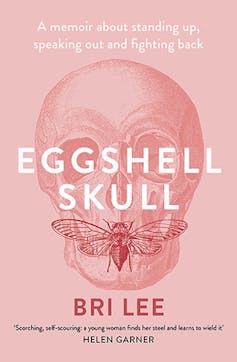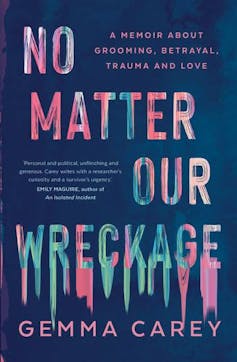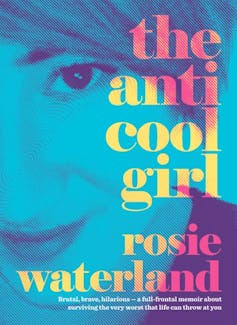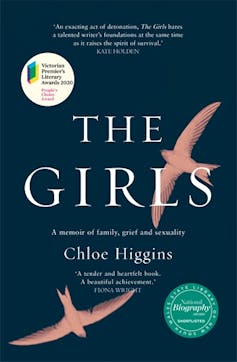Brittany Higgins' memoir will join a powerful Australian collection reclaiming women's stories of trauma. Here are four
- Written by Marina Deller, PhD Candidate, Flinders University
Brittany Higgins has signed a book deal with Penguin Random House Australia. Not just any book — a memoir.
Higgins says her book will be a chance to tell “a firsthand account of what it was like surviving a media storm that turned into a movement”.
Memoir can help readers explore and understand trauma from a very personal perspective. Research suggests writing can be used to work through, or even heal from, trauma. It is a chance for a writer like Higgins, who alleges she was raped in a senior minister’s office, to reclaim her story.
Here are four powerful Australian examples of women’s memoirs about trauma and abuse.
1. Eggshell Skull by Bri Lee
 Allen & Unwin
Sydney-based author, writer, and researcher Bri Lee witnessed justice and heartbreak while working as a judge’s associate in the Queensland District Court. Two years later, she took her own abuser to court.
Although the abuse occurred in childhood, Lee pursued a conviction for the perpetrator (a family friend) in young adulthood. In her 2018 book, she acknowledges that the longer the time between an incident and investigation, the more potential hurdles may arise; her journey for justice is far from straightforward.
Lee acknowledges this in the way she explores personal, public, and legal discourse surrounding abuse. She jumps back and forth in time, and weaves her story with others in the Australian legal system in a blend of journalistic and personal storytelling. This approach also acknowledges trauma can affect memory. Details can be unbearably clear, difficult to remember, or both.
Through poetic reflection, and searing critique, Lee carves a space for her story.
Read more:
This week's news has put sexual assault survivors at risk of 'secondary trauma'. Here's how it happens, and how to cope
2. No Matter Our Wreckage by Gemma Carey
Allen & Unwin
Sydney-based author, writer, and researcher Bri Lee witnessed justice and heartbreak while working as a judge’s associate in the Queensland District Court. Two years later, she took her own abuser to court.
Although the abuse occurred in childhood, Lee pursued a conviction for the perpetrator (a family friend) in young adulthood. In her 2018 book, she acknowledges that the longer the time between an incident and investigation, the more potential hurdles may arise; her journey for justice is far from straightforward.
Lee acknowledges this in the way she explores personal, public, and legal discourse surrounding abuse. She jumps back and forth in time, and weaves her story with others in the Australian legal system in a blend of journalistic and personal storytelling. This approach also acknowledges trauma can affect memory. Details can be unbearably clear, difficult to remember, or both.
Through poetic reflection, and searing critique, Lee carves a space for her story.
Read more:
This week's news has put sexual assault survivors at risk of 'secondary trauma'. Here's how it happens, and how to cope
2. No Matter Our Wreckage by Gemma Carey
 Allen & Unwin
From age 12, Gemma Carey was groomed and abused by a man twice her age. In young adulthood, Carey discovers her mother knew about the abuse. When her mother dies, the enduring effects of this betrayal surface.
Family memoirs are often taboo; family memoir about child abuse and complicity even more so. Despite fraught themes, the Sydney-based author and academic writes with rigour and honesty. Her 2020 memoir asks us to examine social — and family — structures which allow these injustices.
Carey’s tone is dark but inquisitive. She speaks directly to readers, incorporating research, and unpicking the threads of trauma and grief.
Carey emphasises writing about abuse doesn’t always fit a mould. In an interview, she explains, “Writing trauma stories that will change societal narratives around abuse and victims involves showing the contradictions that exist in trauma and grief”.
In her book, she reflects on her younger self,
I was broken and trying to work out how to fix myself … no one had ever given me the tools… I had to figure it out on my own.
This rebuilding took time. At 12, Carey buried her experience, at 17 she successfully took the perpetrator to court, in adulthood, she wrote her memoir.
Read more:
Friday essay: why we need children's life stories like I Am Greta
3. The Anti-Cool Girl by Rosie Waterland
Allen & Unwin
From age 12, Gemma Carey was groomed and abused by a man twice her age. In young adulthood, Carey discovers her mother knew about the abuse. When her mother dies, the enduring effects of this betrayal surface.
Family memoirs are often taboo; family memoir about child abuse and complicity even more so. Despite fraught themes, the Sydney-based author and academic writes with rigour and honesty. Her 2020 memoir asks us to examine social — and family — structures which allow these injustices.
Carey’s tone is dark but inquisitive. She speaks directly to readers, incorporating research, and unpicking the threads of trauma and grief.
Carey emphasises writing about abuse doesn’t always fit a mould. In an interview, she explains, “Writing trauma stories that will change societal narratives around abuse and victims involves showing the contradictions that exist in trauma and grief”.
In her book, she reflects on her younger self,
I was broken and trying to work out how to fix myself … no one had ever given me the tools… I had to figure it out on my own.
This rebuilding took time. At 12, Carey buried her experience, at 17 she successfully took the perpetrator to court, in adulthood, she wrote her memoir.
Read more:
Friday essay: why we need children's life stories like I Am Greta
3. The Anti-Cool Girl by Rosie Waterland
 Harper Collins
In The Anti-Cool Girl (2018), comedian and writer Rosie Waterland reveals a turbulent childhood; drug and alcohol-addicted parents, absent family, death and loss, poverty, mental health struggles, and sexual abuse experienced within the Australian foster care system.
Waterland writes unflinchingly. She tackles difficult subjects with intelligence and humour. Each chapter is addressed to herself: “You will be in rehab several times before you’re ten years old”, or “Your foster dad will stick his hands down his pants, and you will feel so, so lucky”. Like Carey, Waterland acknowledges trauma often manifests in ways which might seem “odd” or “unconventional” to others.
While comedic throughout, Waterland approaches her trauma with care and, understandably, anger. She later lamented that she was unable to name her abuser, due to fears of litigation.
The Anti-Cool Girl, blending humour and pain, remains a testament to Waterland’s endurance and survival.
4. The Girls by Chloe Higgins
Harper Collins
In The Anti-Cool Girl (2018), comedian and writer Rosie Waterland reveals a turbulent childhood; drug and alcohol-addicted parents, absent family, death and loss, poverty, mental health struggles, and sexual abuse experienced within the Australian foster care system.
Waterland writes unflinchingly. She tackles difficult subjects with intelligence and humour. Each chapter is addressed to herself: “You will be in rehab several times before you’re ten years old”, or “Your foster dad will stick his hands down his pants, and you will feel so, so lucky”. Like Carey, Waterland acknowledges trauma often manifests in ways which might seem “odd” or “unconventional” to others.
While comedic throughout, Waterland approaches her trauma with care and, understandably, anger. She later lamented that she was unable to name her abuser, due to fears of litigation.
The Anti-Cool Girl, blending humour and pain, remains a testament to Waterland’s endurance and survival.
4. The Girls by Chloe Higgins
 Pan Macmillan
Chloe Higgins’ sisters — Carlie and Lisa — died in a car accident when Higgins was 17. In her 2019 memoir Higgins — a Wollongong-based author and academic — asks us to consider the nature of ongoing grief and the way trauma stretches over different experiences.
Higgins’ grief influences her sexual experiences in often troubling ways — but the way she discusses it is revolutionary. She explores the weaponisation of sex, how it is a form of self-harm; sex and substance abuse, and the pleasures and pressures of sex work.
She jumps between stories of gentility (caring lovers, exploration, sex clients who felt more like friends) and horror stories featuring coercion and fear, threats, and sex without consent. Higgins examines her own experiences and links them to memory, identity, and control.
In her Author’s Note, Higgins reflects: “Publishing this book is about stepping out of my shame”.
These are not the only parts of me, but they are the parts I’ve chosen to focus on … Since that period of my life, I have begun to recover.
These books signal the importance of memoir as a platform where personal trauma stories are told, reclaimed, and witnessed. They are a valuable (and intimate) contribution to the conversation about trauma and sexual abuse in Australia.
Read more:
Inside the story: writing trauma in Cynthia Banham's A Certain Light
Pan Macmillan
Chloe Higgins’ sisters — Carlie and Lisa — died in a car accident when Higgins was 17. In her 2019 memoir Higgins — a Wollongong-based author and academic — asks us to consider the nature of ongoing grief and the way trauma stretches over different experiences.
Higgins’ grief influences her sexual experiences in often troubling ways — but the way she discusses it is revolutionary. She explores the weaponisation of sex, how it is a form of self-harm; sex and substance abuse, and the pleasures and pressures of sex work.
She jumps between stories of gentility (caring lovers, exploration, sex clients who felt more like friends) and horror stories featuring coercion and fear, threats, and sex without consent. Higgins examines her own experiences and links them to memory, identity, and control.
In her Author’s Note, Higgins reflects: “Publishing this book is about stepping out of my shame”.
These are not the only parts of me, but they are the parts I’ve chosen to focus on … Since that period of my life, I have begun to recover.
These books signal the importance of memoir as a platform where personal trauma stories are told, reclaimed, and witnessed. They are a valuable (and intimate) contribution to the conversation about trauma and sexual abuse in Australia.
Read more:
Inside the story: writing trauma in Cynthia Banham's A Certain Light
Authors: Marina Deller, PhD Candidate, Flinders University




